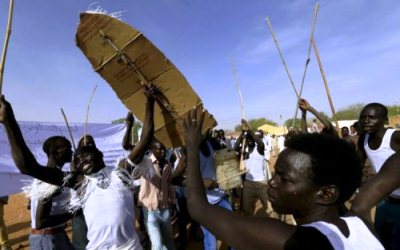South Sudanese refugees in North Darfur appeal for humanitarian assistance

August 5, 2016 (EL-FASHER) – Thousands of South Sudanese refugees in North Darfur state have launched an appeal to the Sudanese government and aid groups to provide them with food, clothing and shelter.
Last month Sudan said it has received 500,000 South Sudanese refugees since 2013.
South Sudanese tribal chief Ajack Deng Kual told Sudan Tribune that 7,000 refugees have arrived in the locality of Al-Leit, 325 km. south east of North Darfur capital, El-Fasher from Bahr el-Ghazal region in South Sudan.
He pointed that there are no official statistics on the exact number of refugees who arrived in North Darfur, saying they are in dire need for food, shelter, drugs and clothing.
For his part, Deng Malonk Akol, a refugee from Awil town, pointed to the miserable situation in South Sudan, saying the vast majority of refugees in North Darfur are women, children and the elderly.
Joseph Garang Atak, a refugee from north Bahr el-Ghazal, said they sleep on the floor of the farms in which they took refuge, demanding the Sudanese government and aid groups to provide them with shelter.
Last month, fighting erupted in South Sudan’s capital Juba between followers of President Salva Kiir and Riek Machar, the former rebel leader who became vice president under a deal to end a two-year civil war.
The violence, which has killed hundreds of people, broke out as the world’s newest nation prepared to mark five years of independence from Sudan on July 9.
Last month, UN Office for the Coordination of Humanitarian Affairs (OCHA) said that refugees fleeing conflict and food insecurity in South Sudan continue to arrive in Sudan.
It pointed out that “as of 3 July, 79,571 people from South Sudan had arrived in Sudan since 1 January 2016, of whom 53,273 in East Darfur”.
On 17 March, Sudanese government announced a decision that all South Sudanese in Sudan are to be treated as foreigners, instead of ‘brothers and sisters’ as they were previously regarded.
South Sudan broke away from Sudan in July 2011 and established its own independent state after decades of war between the two former northern and southern regions of one country.
(ST)
